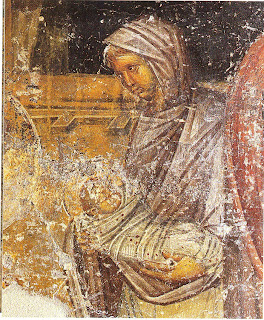 Theodora Palaiologina died at Stameron in November 1429, in the throes of labor. "She left behind," wrote Sphrantzes, her husband's close aide, "much grief for her husband and for all of us, because she was really lovely."
Theodora Palaiologina died at Stameron in November 1429, in the throes of labor. "She left behind," wrote Sphrantzes, her husband's close aide, "much grief for her husband and for all of us, because she was really lovely."Kleope Palaiologina died in April 1433 at Mistra from the results of childbirth. "She was outstanding," wrote Chalcocondyles who knew her,"for her beauty and all other seemliness." In an eloquent eulogy, Kleope's doctor, Demetrios Pepagomenos, said that her residence among them had made them better, and mentioned an infant born too soon, a daughter, her companionship with her husband.
When their father-in-law, Manuel II, whom neither woman had ever met, visited the Morea in 1415, Pepagomenos was with his suite. He was a specialist in gout. He was left in Mistra to serve Theodoros II as court physician.
The author of Mazaris, a book of upper-class male humor written for Theodoros, was also traveling with Manuel. He said Pepagomenos was a skilled poisoner, and had even poisoned himself and someone's secretary by mistake. There are a lot of doctors in Mazaris, and the author gives them all a rough time. Byzantine humor when not scatological involved satire at the expense of others who were usually present. Humans have always and ever joked about doctors killing their patients: we need not take any of this as courtroom evidence. This was written as humor and the Mistra intellectuals were probably rolling on the floor, howling with laughter.
We are told Pepagomenos had two sons. The younger, Theodosios, nicknamed "Little S**t," was driven by ambition to rise at court, while the older, nicknamed "Lizard Eyes," had also entered the ranks of licensed killers. This, too, was found hilarious.
Pepagomenos means "frozen." Mazaris missed a chance to joke about it. That is irrelevant here. And the eulogy makes it difficult to connect the man with any idea of frozen.
What is relevant is that he was Kleope's doctor. Given the intense conservatism of the last Palaiologoi in regard to the aides they employed, it is very likely that he was also Theodora's doctor. And most medical knowledge and practice was based on sources 1500 years old.
In Florence in those years, one could expect one maternal death for sixty-nine childbirths. Ultimately, one woman out of five would die as the result of childbirth, But here in the imperial family, we have two maternal deaths for three childbirths.
Kleope had successfully given birth to a daughter in the winter of 1428-1429. One of her letters indicates that she was worried about the birth, but there is no way to know whether she knew of a problem, or whether it was normal concern. Her mother had died in childbirth, after at least five successful pregnancies. Still, Kleope had that intimate loss behind her concern. That first birth went well: she had a daughter Helena who in turn had daughters, Charlotte and Cleope.
There is evidence over many centuries that a radicalization of death rates happened whenever men moved into midwives' territory, and got hands-on where midwives knew better than to interfere. A fine book, A Midwife's Tale, based on a diary written in the early 1800s, before penicillin and before the germ theory of disease, records a single maternal death for Martha Ballard out of 1000 deliveries. It also relates what happened when a doctor settled in the area and the status effect drew patients she had successfully delivered to him, a decision. often taken by the husband.
All this may be traducing a good man. Kleope and Theodora might well have died without him. We cannot blame Pepagomenos for a premature birth, but it was not a good thing to be an imperial lady in the medieval Morea.
Further examination of the sparse material we have for Kleope/Cleofe makes it clear that she died from a massive hemorrhage, but we do not know what caused the hemorrhage. In his monody, Nikeforas Cheilas implied that Dr. Pepagomenos had killed her. Theodoros did not think so, as Dr. Pepagomenos gave one of the formal funeral monodies. But a maid or waiting-woman might have seen him do something clumsy -- the man was a specialist in gout, not in obstetrics -- and there might have been talk that Cheilas picked up on.
ReplyDelete